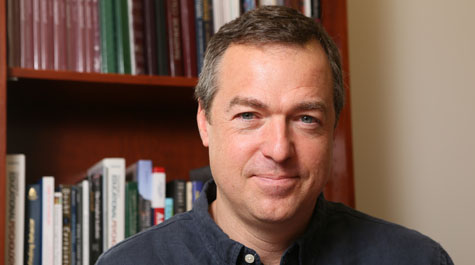Psychology professor Vishton explores the powers of the unconscious mind in Tack Lecture
Update: The event has reached capacity, but it may be viewed live online at www.wm.edu/lecture/watch - Ed.
Picture this: You’re standing in a garden on a gorgeous spring day when you spot a flower and decide to reach out and pluck it. You give yourself a mental pat on the back for choosing such a beautiful flower, unaware of the fact that the choice wasn’t actually yours at all. In fact, it was made before you even realized you were going to make it.
If that sounds like the makings of a sci-fi novel, it’s not. It’s plain old science. That invisible force that’s controlling your every move and decision is actually your brain — on autopilot.
“Most people presume that these conscious thoughts that we have about what we’re going to do, what we think, what we say — that they all start with a conscious decision of ‘I’m going to do X,’” said Peter Vishton, associate professor of psychology at William & Mary. “It turns out that’s wrong. It’s not that our conscious thoughts don’t influence our actions at all, it’s that in many cases — I’ll argue in most cases — it’s the actions that come first.”
{{youtube:medium|cjejERrk-Hs, Tack Faculty Lecture Series featuring Dr. Peter Vishton}}
How the unconscious mind controls those actions, and how we can learn to manipulate it, will be the subject of Vishton’s discussion for the spring Tack Faculty Lecture, which will be held March 22 at 7 p.m. in the ISC III Theatre 1221. (Those planning to attend are requested to RSVP.) The lecture series is held at least once a semester, thanks to a generous donation from Martha ’78 and Carl Tack ’78, and invites a W&M professor to address the community on a topic of general interest.
“The Illusion of Control,” the 11th Tack Faculty Lecture, will explore evidence that there are unconscious processes driving our movements and decisions and consider ways to consciously outsmart the unconscious mind.
“There are hidden, very complex and important brain processes that make our bodies work,” said Vishton, “but this isn’t just about visual motor processes. It turns out these processes are also at work when deciding things like where you’re going to go to college, what you’re going to say, where you’re going to walk and what sorts of purchasing decisions you’re going to make.”
While the study of the origin of actions is something even ancient Greek philosophers considered, said Vishton, it wasn’t until the past few decades that researchers began finding scientific evidence that our conscious thoughts aren’t the initial driver of our actions. Technology like EEGs and fMRIs have enabled scientists to track brain activity that predicts a certain movement hundreds of milliseconds before a subject knows they are going to do it.
Even more surprising, said Vishton, is that people believe they are in control even when control is physically impossible. In one study, by Harvard neurologist Alvaro Pascual-Leone, participants were asked to move their right or left hand, but, before the movement took place, Pascual-Leone used transcranial magnetic stimulation to twitch the opposite hand. When prompted for an explanation, participants reported they’d simply changed their minds. 
“The application to that in every day life I think is really striking,” said Vishton. “When we engage in a behavior, we presume it’s because we decided to do it. But even in situations where we absolutely know that it wasn’t your choice … there’s still this illusion of control.”
Beyond simple motor skills, the unconscious has a hand in most parts of daily life, often to our benefit (such as when driving the same route to work every day). Other times, however, it can sabotage conscious goals, sending a roaming hand into a box of donuts on day two of a diet. Acknowledging and anticipating unconscious impulses, Vishton said, can help curb bad habits and establish new ones.
“Treat yourself maybe in the way you would encourage a 2-year-old to stop eating donuts,” said Vishton. “One of the big things is you want to put them away; you don’t want them to be visible. You want to avoid situations where a short, easy action can cause that eating behavior to occur.”
Insights like these and more will be discussed in Vishton’s lecture. On a macro level, Vishton said he hopes his talk will also serve as a reminder to appreciate the science that goes into understanding ourselves and the world around us.
“At a very granular level, I’ll talk about ways you can regulate your behavior and make better decisions,” said Vishton. “On the other hand, I’m a psychological scientist, and I think the function of the brain and how it relates to the body and the world around us is utterly fascinating. So I hope the stories I tell and the research I talk about will give people a glimpse into some wondrous things that we take completely for granted every day.”















